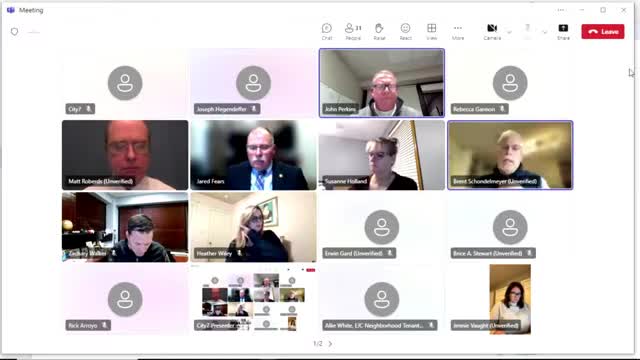Public speakers urge pause on Independence RentalReady changes; ordinance receives first reading
Get AI-powered insights, summaries, and transcripts
Subscribe
Summary
The Independence City Council on Jan. 6 heard multiple public comments urging a pause and more tenant input on proposed amendments to the city’s RentalReady program and the landlord-tenant code.
The Independence City Council on Jan. 6 heard multiple public comments urging a pause and more tenant input on proposed amendments to the city’s RentalReady program and the landlord-tenant code.
Brent Schottenmeier, a resident of Independence, told the council that, since RentalReady’s adoption in 2017, “there is little oversight, transparency, or accountability with respect to city required inspections of rental properties.” He said one private inspection firm “could not provide documentation of the Independence Towers inspection” and reported his analysis showing that the firm performed 54.7% of the city’s rental inspections in the most recent year.
Why it matters: the proposed changes would alter how rental inspections are performed and enforced and include operational changes such as tying a landlord’s business license to utility activation for tenants. Public speakers said that, because Independence has roughly 42,000 renters, changes to inspection processes and enforcement could have broad effects on housing stability and reporting incentives.
Ally White, a mortgage holder and a leader with the Eastern Jackson County Tenant Union, asked the council to “pause the process of these amendments for 30 days to allow for meaningful tenant contributions to the content of the amendments.” White warned that stronger or more frequent private inspections could unintentionally create incentives for tenants to hide problems or for the system to overburden city staff, and she said underreporting of housing complaints is already a concern.
Property owner Matt Roberts told the council he supports improved accountability but raised data-quality concerns with tying utility activation to business-license records. Roberts said the city’s downloadable property dataset contained about 18,700 entries, with roughly 1.5% bad addresses and about 12% exact duplicates; he described how those errors produced a “33% failure rate” that he reduced to 28% after updating his information. Roberts urged a CityWorks data cleanup and said the city should confirm the legal basis before shifting inspection responsibility back to city staff.
Resident Marc Yanda raised technical code questions, including window-opening and glazing standards: “The window that we're talking about is 36 inches on the opening. And IBC, if we're gonna follow that code, is 24.” He also flagged language about LLC registration that he said would not cover other business entities.
Council action and next steps: the council placed an ordinance amending chapter 5, article 11 (landlord-tenant code) and article 15 (RentalReady) on the agenda as first reading (ordinance 25-004). The first reading occurred during the Jan. 6 meeting but the council did not adopt final changes at that time. Several council members and staff said additional technical work and engagement are expected: Brent Schottenmeier referenced a February 10 study session as a likely forum for staff presentation on inspection approaches; Councilman Fears said he would withhold his comments on the proposal until the formal vote; and Councilwoman McCandless asked the audit and finance committee to consider whether the rental-inspection system should be reviewed.
What speakers asked for: public commenters sought (1) a 30-day pause to allow tenant representation in drafting final changes; (2) an independent review of the private inspection program’s records and performance; (3) fixes to data and licensing records before enforcement mechanisms (such as tying utilities to business licenses) are used; and (4) clearer technical definitions in code language (e.g., business-entity registration and building-code references).
Clarifying details: Brent Schottenmeier said a private firm could not provide documentation for an Independence Towers inspection and that the firm performed 54.7% of inspections in a recent 12-month period. Ally White said there are about 42,000 renters in Independence. Matt Roberts reported the city’s downloadable registry had roughly 18,700 properties, about 1.5% bad addresses and about 12% duplicates; he described a prior 33% failure rate that fell to 28% after updating a license record. Marc Yanda called attention to window-opening dimensions and IBC/HUD glazing guidance.
Council and staff responses: city staff and council members acknowledged data challenges and said staff have proposed measures such as improved records retention and additional city review of private-inspection documentation. Council members said more technical review and public input will be pursued through an upcoming study session and committee review before a final vote.
Ending: the ordinance amending the landlord-tenant code and RentalReady program (25-004) completed a first reading on Jan. 6; the council signaled it would continue technical work and pursue additional stakeholder engagement before a final vote. The transcript shows the city intends further study and committee review; no final adoption occurred at this meeting.
